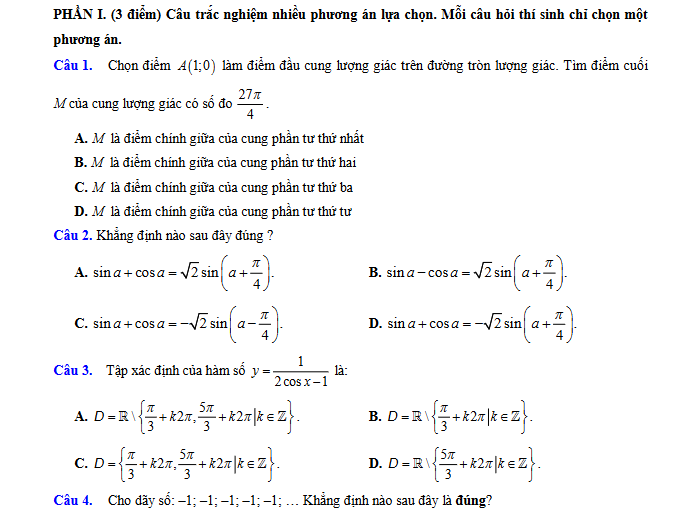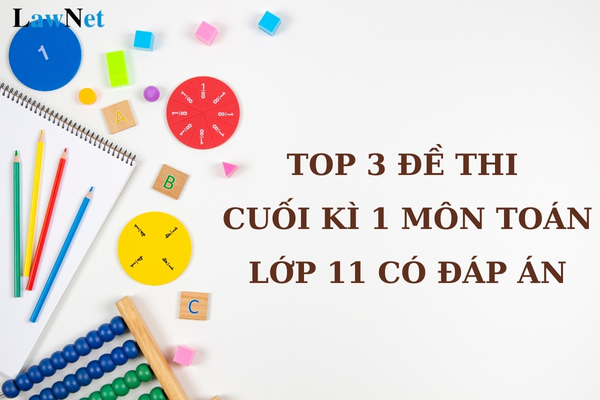Vietnam: What are the Top 3 1st end-of-semester question papers and answers for 11th-grade Mathematics? What are the perspectives on developing the 11th-grade Mathematics curriculum?
What are the Top 3 1st end-of-semester question papers and answers for 11th-grade Mathematics?
The 1st end-of-semester question papers and answers for 11th-grade Mathematics will be structured as follows:
- Part I. (12 questions – 3 points): Multiple-choice questions with several answer options. Candidates choose only one option per question.
- Part II. (4 questions – 4 points): True-false questions. In each part a), b), c), d) of each question, candidates choose true or false.
- Part III. (6 questions – 3 points): Short answer questions. Candidates provide the answer directly for each question.
Students can refer to the following top 3 1st end-of-semester question papers and answers for 11th-grade Mathematics to prepare well for the upcoming exam:

Download Top 3 1st end-of-semester question papers and answers for 11th-grade Mathematics
Note: The above content is for reference only!

What are the Top 3 1st end-of-semester question papers and answers for 11th-grade Mathematics? What are the perspectives on developing the 11th-grade Mathematics curriculum in Vietnam? (Image from the Internet)
What are the perspectives on developing the 11th-grade Mathematics curriculum in Vietnam?
Under Section II of the General Education Program for Mathematics issued with Circular 32/2018/TT-BGDDT, the perspectives on developing the 11th-grade Mathematics curriculum in Vietnam are as follows:
- The Mathematics curriculum adheres to the basic regulations stated in the overall program; inherits and enhances the advantages of the current and previous programs, selectively adopts the curriculum development experiences of advanced countries worldwide, and approaches the achievements of educational science, considering Vietnam's economic and social conditions. Concurrently, the Mathematics curriculum emphasizes several perspectives:
(1) Ensuring simplicity, practicality, and modernity
- The Mathematics curriculum ensures simplicity, practicality, and modernity by reflecting the essential content to be addressed in general education, satisfying the world understanding needs and interests of learners, and aligning with the contemporary global approach. The program embodies the spirit of "Mathematics for everyone," allowing each person to learn Mathematics in a way that suits their interests and abilities.
- The Mathematics curriculum focuses on application, integrating with practical issues or other educational subjects, especially those related to STEM education, reflecting modern developments in economics, science, societal life, and urgent global issues (such as climate change, sustainable development, financial education, etc.).
This is also demonstrated through practical and experiential activities in mathematics education with various forms like conducting mathematics study projects, especially those related to practical applications; organizing math games, mathematics clubs, forums, seminars, competitions, etc., providing opportunities for students to creatively apply their knowledge, skills, and experiences in practice.
(2) Ensuring consistency, coherence, and continuous development
The Mathematics curriculum ensures consistency and continuous development (from grades 1 to 12), comprising two closely linked strands: one describes the development of core knowledge content and the other focuses on the development of students' competencies and qualities. Additionally, the Mathematics curriculum considers continuity with preschool education programs and lays the foundation for vocational and higher education.
(3) Ensuring integration and diversification
- The Mathematics curriculum implements intradisciplinary integration around three knowledge threads: Numbers, Algebra, and Elements of Analysis; Geometry and Measurement; Statistics and Probability; and interdisciplinary integration through related topics or mathematical knowledge explored and applied in other subjects like Physics, Chemistry, Biology, Geography, Informatics, Technology, History, Art, etc.; integrating both intra and interdisciplinary content through practical and experiential activities in mathematics education.
- Simultaneously, the Mathematics curriculum ensures differentiation requirements. For all educational levels, Mathematics strictly follows the spirit of individualized teaching, ensuring the majority of students (across all regions nationwide) meet the program's required standards; while also paying attention to special groups (talented students, students with disabilities, students in difficult circumstances, etc.).
At the upper secondary level, Mathematics includes an in-depth academic topic system and learning content to help students enhance their knowledge, and practical skills, and apply them to solve real-world problems.
(4) Ensuring openness
- The Mathematics curriculum provides unified orientation and essential mathematics education content, mandatory for students nationwide, while granting autonomy and responsibility to localities and schools in selecting, and supplementing some mathematics education content, and implementing educational plans suitable to the local conditions and educational institutions.
- The Mathematics curriculum specifies general principles and guidelines on required standards for students' qualities and capabilities, educational content, educational methods, and evaluation of educational outcomes without too detailed specifications, to allow textbook authors and teachers to develop programs creatively and independently.
- The Mathematics curriculum ensures stability and adaptability during implementation in line with scientific-technological progress and practical requirements.
What academic topics do 11th-grade students in Vietnam learn in Mathematics?
According to Section V of the General Education Program for Mathematics issued with Circular 32/2018/TT-BGDDT, 11th-grade students study the following 3 academic topics in Mathematics:
academic topic 11.1: Plane Transformations.
academic topic 11.2: Elements of Technical Drawing.
academic topic 11.3: Introduction to Elements of Graph Theory.

